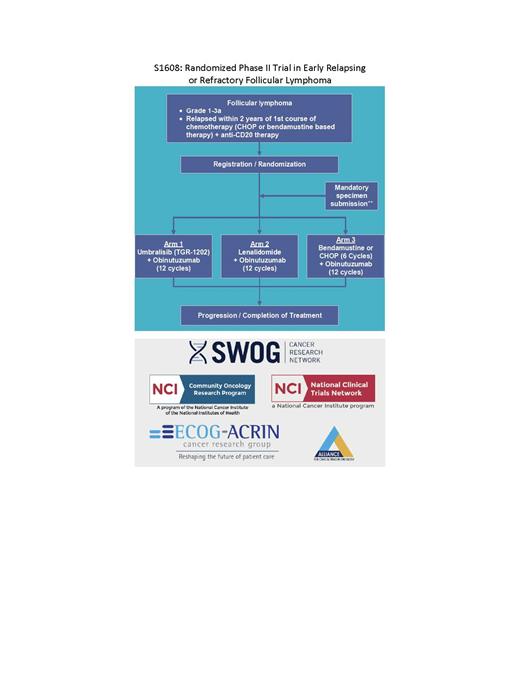Abstract
While the majority of follicular lymphoma (FL) patients have an overall survival of nearly 2 decades, a subset of patients has a markedly inferior survival. Across randomized studies, 20% of patients will respond poorly to first-line chemoimmunotherapy and account largely for the early deaths in the larger FL population. This group represents the largest unmet need in FL, for which a precision approach to therapy must be developed. With the development of newer monoclonal antibodies, immunomodulatory agents, therapies targeting molecules downstream of the B-cell receptor and novel cellular strategies, non-cytotoxic treatment has the potential to improve outcomes for patients with early progressing FL.
There are several validated clinical factors known to correlate with disease outcome in newly diagnosed FL including age, lactate dehydrogenase, β2-microglobulin and disease extent that have been incorporated in prognostic systems such as FLIPI and FLIPI2. More recently, genetic biomarkers have been identified, including MLL2, EZH2, IRF4, CREPPB, and EPHA7 which reflect the disease biology as well as the impact of the lymphoma microenvironment. The addition of these molecular aberrations to clinical factors has led to the development of the M7-FLIPI as well as a 23-gene score, improving risk prognostication for newly diagnosed FL patients. However, such systems have shown a limited ability to predict progression or relapse within 2 years of chemotherapy. As such, identification of these patients at diagnosis or prior to therapy is currently not possible.
S1608 was developed to 1) enable identification of high-risk patients using clinical and molecular markers by validating the m7-FLIPI prognostic system and to 2) identify the novel therapeutic approaches most active in this population. This study is enrolling high-risk patients, refractory to chemoimmunotherapy, and in randomized fashion, comparing novel regimens against additional chemotherapy to identify the most active non-chemotherapeutic strategies for this population. Eligible patients must be 18 years or older with grade 1, 2 or 3a FL and have relapsed or progressed with 2 years of finishing their first course of chemoimmunotherapy. Previous chemotherapy must have been CHOP or bendamustine based. Patients are eligible regardless of anti-CD20 therapy used, whether radiation therapy had been administered and whether or not maintenance therapy was utilized. Note that patients are required to have evidence of progressive disease within 2 years but do not have to be registered within 2 years. These high-risk patients are randomized to 12 months of lenalidomide, umbralisib or additional chemotherapy (for 6 months), all combined with 12 months of obinutuzumab. The primary clinical endpoint is CR rate after 6 cycles, allowing responding patient to proceed with consolidative cellular therapies if desired by the treating physician. Biopsies from diagnosis and at the time of relapse as well as circulating tumor DNA are being collected to prospectively evaluate the m7-FLIPI and to identify additional predictive markers.
S1608 is a collaborative effort amongst the SWOG, Alliance and ECOG-ACRIN cooperative groups. The study represents one of the only prospective efforts to characterize early progressing FL and the only randomized trial comparing treatment strategies for this group of follicular lymphoma patients most in need of alternative therapies.
Funding: NIH/NCI/NCTN grants U10CA180888, U10CA180819, U10CA180820, U10CA180821; and TG Therapeutics, Inc.
Barr: Genentech: Consultancy; AstraZeneca: Consultancy; Morphosys: Consultancy; TG Therapeutics: Consultancy; Beigene: Consultancy; Abbvie/Pharmacyclics: Consultancy; Bristol Meyers Squibb: Consultancy; Seattle Genetics: Consultancy; Janssen: Consultancy; Gilead: Consultancy. Link: Novartis, Jannsen: Research Funding; MEI: Consultancy; Genentech/Roche: Consultancy, Research Funding. Flowers: Cellectis: Research Funding; Nektar: Research Funding; Takeda: Research Funding; TG Therapeutics: Research Funding; BeiGene: Consultancy; 4D: Research Funding; Karyopharm: Consultancy; Morphosys: Research Funding; Guardant: Research Funding; Bayer: Consultancy, Research Funding; Genmab: Consultancy; Eastern Cooperative Oncology Group: Research Funding; SeaGen: Consultancy; Genentech/Roche: Consultancy, Research Funding; Pharmacyclics/Janssen: Consultancy; Burroughs Wellcome Fund: Research Funding; AbbVie: Consultancy, Research Funding; Adaptimmune: Research Funding; Janssen: Research Funding; Iovance: Research Funding; Acerta: Research Funding; Kite: Research Funding; Allogene: Research Funding; EMD: Research Funding; Amgen: Research Funding; Celgene: Consultancy, Research Funding; Ziopharm: Research Funding; Novartis: Research Funding; Pfizer: Research Funding; Sanofi: Research Funding; National Cancer Institute: Research Funding; Xencor: Research Funding; Spectrum: Consultancy; Gilead: Consultancy, Research Funding; Epizyme, Inc.: Consultancy; Biopharma: Consultancy; Denovo: Consultancy; Cancer Prevention and Research Institute of Texas: CPRIT Scholar in Cancer Research: Research Funding; Pharmacyclics: Research Funding. Weigert: Janssen: Speakers Bureau; Epizyme: Membership on an entity's Board of Directors or advisory committees; Roche: Research Funding. Herrera: ADC Therapeutics: Consultancy, Research Funding; Tubulis: Consultancy; Karyopharm: Consultancy; Kite, a Gilead Company: Research Funding; Bristol Myers Squibb: Consultancy, Research Funding; Gilead Sciences: Research Funding; Merck: Consultancy, Research Funding; Genentech: Consultancy, Research Funding; Takeda: Consultancy; Seagen: Consultancy, Research Funding; AstraZeneca: Consultancy, Research Funding. Weinstock: SecuraBio: Consultancy; ASELL: Consultancy; Bantam: Consultancy; Abcuro: Research Funding; Verastem: Research Funding; Daiichi Sankyo: Consultancy, Research Funding; AstraZeneca: Consultancy; Travera: Other: Founder/Equity; Ajax: Other: Founder/Equity. Leonard: ADC Therapeutics, AstraZeneca, Bayer, BMS/Celgene, Epizyme, Inc., Genmab, Gilead/Kite, Karyopharm, BMS/Celgene, Regeneron, MEI Pharma, Miltenyi, Roche/Genentech, Sutro: Consultancy; Roche/Genentech: Consultancy. Kahl: Abbvie, BeiGene, AstraZeneca, Acerta: Research Funding; Research to Practice: Speakers Bureau; Abbvie, ADCT, AstraZeneca, Beigene, Celgene, Teva, Janssen, MTEM, Bayer, InCyte, Adaptive, Genentech, Roche, MEI, KITE, TG Therapeutics, Epizyme, Takeda: Consultancy. Smith: Celgene, Genetech, AbbVie: Consultancy; Alexion, AstraZeneca Rare Disease: Other: Study investigator. Friedberg: Novartis: Other: DSMC ; Acerta: Other: DSMC ; Bayer: Other: DSMC .


This feature is available to Subscribers Only
Sign In or Create an Account Close Modal